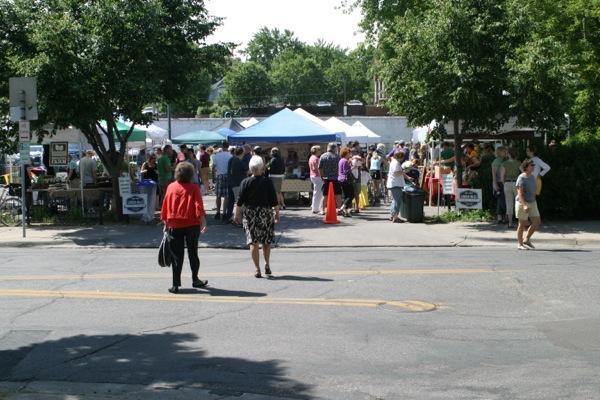Sometimes things take you by surprise. When I found out that indeed, a farmers market was coming to my neighborhood, mere steps from my house, I was excited. However, the response to the Linden Hills Farmers Market was anything but unanimous. Call it naivite or what have you, but I could not believe how many folks were arguing about how this market would take from that market, blowing the "it isn't fair" horn, or living in some unrealized or unknown fear. So, I want to simply ask the question, "Can too many farmers markets be a bad thing?"
What would happen if cities were suddenly inundated with farmer markets? As it is, there are over 50 in the Twin Cities metro area and more are added every year. Hardly ever does one hear about a market having to shut down because of a lack of vendors or customers. So if we suddenly find ourselves with a market in every neighborhood and every town, who would lose? Perhaps this is the more illuminating question.
I certainly don't see supermarkets and grocery stores going through hard times because you can buy vegetables, eggs and meat just down the road. The citizens certainly have nothing but gain (unless you are one of those short-sighted people who can't get past the "parking" issues that a market creates in a neighborhood.) Vendors? Some may lose out, but this gets us back to the old adage that competition only makes you stronger or better. In the end, I can't imagine many farmers or other vendors complaining in earnest about having too many options to sell their wares. Yes, there may be some growing pains as vendors try to staff multiple markets, some may make bad decisions and fold, but in the end, more markets should mean more opportunity.
I brought this issue up with a local restaurant owner and sometimes vendor at farmers markets and we found ourselves talking about the Starbucks example. I remember when they were growing exponentially and everywhere you looked, there seemed to be another new coffee shop (there are now over 17,000 Starbucks globally.) I also remember how small business owners were lamenting that they were done for. "Throw in the towel, Starbucks is coming, how can we compete with them?"
In the end, it turns out that perhaps the opposite is true. In an article in Slate.com, there are a couple of amazing testimonials about how Starbucks moving in created a business boom for the local, independent shops. What happened was that Starbucks succeeded in actually creating not just a new market of coffee drinkers, but they also created a buzz around espresso drinks. Their growth and constant marketing blitz introduced new coffee drinkers into the fold who may never have ventured into a high-end coffee house.
How does this relate to farmers markets? Seems obvious to me that if we inundate a place with markets promoting fresh, local goods, we may actually begin introducing a whole new crowd of people to the market mentality. I could preach all I want about the benefits of a farmers market, but nothing much will change unless there is one just steps from someone's house. Sad as it is, we are not terribly motivated to change our habits, so we have to make it easier by bringing markets closer to home. Once something enters the space where you live, it becomes much more personal. I truly believe that the more markets we have, the better chance we have of getting good, local food to all people.
The coffee comparison also gives us a chance to pursue that idea of competition a little further. What would we do in a world without competition? We would probably languish in adequacy, albeit a peaceful, easy adequacy. Continuing to use the Starbucks example, do local coffee shops ever worry about not being able to make coffee as well as them? Not once in my research did I hear that problem come up. As a matter of fact, most independent shops look down on their coffee as extremely inferior. This should really work to boost the image of the independent shop. It is like getting a free taste test that you always win.
Let's again apply this to the farmers market. Say you've been buying tomatoes from a huge box store and suddenly a farmers market or even a single vendor's stand moves into your neighborhood. That fresh picked tomato is guaranteed to be amazingly different and full of flavor. Sometimes shockingly so. Anyone paying attention suddenly learns a valuable lesson about local produce and the value of a marketplace that sells it. As much as I love food co-ops, they are simply not as approachable as an open air market, so without one, this comparison shopping may never happen. Plus, it is much easier to start a farmers market than to build a cooperative grocery store. Competition plus accessibility should make our local farmers really shine.
 When I went to the Linden Hills Farmers Market's inaugural day, I must admit, I loved it. Not only were there some amazing vendors, but the selection was brilliant for its size. There was a local grain vendor, eggs, meat, bakery, coffee, prepared food, jams, pickles, cheese, and of course, veggies. Some of these vendors I knew from other markets and some were new to me. It was a great mix.
When I went to the Linden Hills Farmers Market's inaugural day, I must admit, I loved it. Not only were there some amazing vendors, but the selection was brilliant for its size. There was a local grain vendor, eggs, meat, bakery, coffee, prepared food, jams, pickles, cheese, and of course, veggies. Some of these vendors I knew from other markets and some were new to me. It was a great mix.
I was able to create 90% of my menu for the week based on what I found. Not only that, I met many of my neighbors, who otherwise I would not have seen on any other Sunday and have certainly never seen at one of the other farmers markets before. And where were the people who were grumbling about this market being a bad thing? I certainly didn't see them. Perhaps they were at home, chewing on some flavorless store bought lettuce, but hopefully they simply did their market shopping on a Saturday and visited one of our other fine farmers markets in these Twin Cities of Minnesota.
Here was the dinner menu for the week if you would like a little market inspiration:
Sunday night: Lori Callister chicken, roasted with fresh market herbs and potatoes (from last years crop still!!) Patisserie 46 multigrain bread with local butter and a green salad with market lettuce.
Monday: Quiche with market eggs, herbs and chard. Flour for crust by Sunrise flour mills. Local asparagus with garden garlic chives.
Tuesday: Quesadillas with market cheese, onions and greens. Side salad and local chips from Whole grain milling, local sour cream and salsa from my Latin Tongue eating adventures. (Tortillas were not local, try La Poblanita for a local tortilla source)
Wednesday: Dinner salad with all local ingredients from my garden or the market, including, red lettuce, spinach, arugula, Star Thrower farms blue ewe cheese, roasted beets, smoked trout (from Clancey's meat and fish) and toasted walnuts (ok, those aren't local.)
Thursday: Turkey burgers with Lori Callister ground turkey, goat cheese, braised chard, spring onions served with turnip fries.

Check out these fantastic local markets…and feel free to recommend your own below:
Linden Hills Market http://www.facebook.com/lindenhillsfarmersmarket
Fulton Market http://www.fultonfarmersmarket.org/
Kingfield Market http://www.kingfieldfarmersmarket.org/
Mill City http://millcityfarmersmarket.org/
Uptown http://www.uptownmarket.org/
Midtown http://midtownfarmersmarket.org/
Northeast http://www.facebook.com/NortheastFarmersMarket
St. Paul downtown http://stpaulfarmersmarket.com/

Lawrence Black is a writer and editor at Simple, Good, and Tasty. He has two kids and loves gardening and eating with them. He wrote an article about kids and gardening called: Hey boy, don't eat all the rhubarb. His last article for SGT was Ripe, a cookbook review. He can be reached at lawrence@simplegoodandtasty.com.




